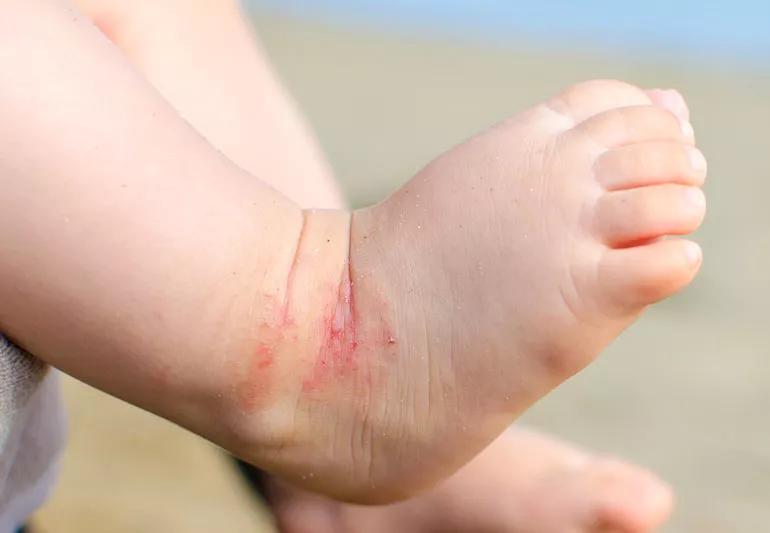Keeping their skin moisturized — and scratching at bay — is half the battle

Image content: This image is available to view online.
View image online (https://assets.clevelandclinic.org/transform/ab022ee8-700f-4e7d-a51b-3ec753833b47/baby-feet-with-Eczema-596089610-770x533-1_jpg)
Close up of a baby's foot that shows eczema irritated skin.
Nobody wants to see their kid itching and miserable — but a lot of us do, thanks to eczema. According to pediatric dermatologist Joan Tamburro, DO, up to 30% of children under age 2 can have atopic dermatitis, more commonly known as eczema.
Advertisement
Cleveland Clinic is a non-profit academic medical center. Advertising on our site helps support our mission. We do not endorse non-Cleveland Clinic products or services. Policy
Eczema is an inflammation of the skin that tends to run in families. It’s most common in those with a personal or family history of asthma, hay fever or other allergies.
Most children outgrow the condition, although flare-ups (flares) can recur throughout life. And dry, sensitive skin may always be a concern. We talked to Dr. Tamburro about the best way to treat your child’s eczema flares — and what you can do to help prevent them.
What exactly is eczema, anyway?
Eczema is an inflammatory disorder of the skin. When you have eczema, your top layer of skin — the skin barrier — is weakened. That allows allergens to penetrate into your skin, causing inflammation.
“Eczema can start as dry skin, but it’s more than dryness,” says Dr. Tamburro. “It often turns into a red, extremely itchy rash that can even ooze. Sometimes, scratching can cause the rash to bleed, crust and scale over.” The resulting areas of open skin can lead to skin infections.
Eczema can appear anywhere on the body, Dr. Tamburro says, but location often changes with age. It’s usually on the:
Advertisement
While dry skin can trigger flares, so can environmental factors, including:
“Some parents are aggressive at treating other health problems but disregard their child’s eczema, thinking skin problems are no big deal,” notes Dr. Tamburro. “When children are itchy every day of their life, it is a big deal. Kids suffer with it.”
Itching due to eczema can prevent children from sleeping well. It’s also highly distracting, which can make it hard to concentrate on learning during school or daycare.
There are many ways to treat eczema, from prescription medications and over-the-counter medications to creams and home remedies. Here are some tried-and-true methods to treat an eczema flare:
If your child’s skin isn’t responding well — or if their eczema is getting worse — it’s time for a trip to their pediatrician. Depending on the cause and severity of your kiddo’s rash, their doctor may prescribe:
While these treatments help, eczema prevention is equally important.
In addition to avoiding triggers, good skin care is the best way to prevent the dry, itchy skin that can provoke eczema flares. Dr. Tamburro recommends parents help children with eczema:
Advertisement
While it’s not curable, eczema can be managed, says Dr. Tamburro. And many children do outgrow the condition, or at least can go longer in-between flares.
Still, people who’ve had flares, even as infants, need to protect their skin for the rest of their lives.
The good news: If you talk to your little one about what you’re doing and why, all the time and energy you put into managing your child’s eczema will help them keep their skin healthy and clear as they get older.
Advertisement

Delivered every Tuesday!
Sign up for our Health Essentials emails for expert guidance on nutrition, fitness, sleep, skin care and more
It's a letter about the news!
Learn more about our editorial process.
Advertisement
Colloidal oatmeal, petroleum jelly and other around-the-home products can help provide needed relief
Your body’s natural response to stress can lead to painful skin irritation
From hyperactive immune response to disordered nerve connections, the itch is real
Eczema triggers are different for everyone, but there are some common ways to manage and prevent flare-ups
Hot or cold, your eczema can have flare-ups during multiple times of the year
Keep your showers short and lukewarm, and moisturize promptly after with a cream containing ceramides
Steroids, self-injections and medications can be game changers
Ingredients to look for and ones to avoid
Type 2 diabetes isn’t inevitable with these dietary changes
Applying a hot or cold compress can help with pain
Pump up your iron intake with foods like tuna, tofu and turkey